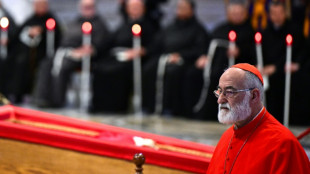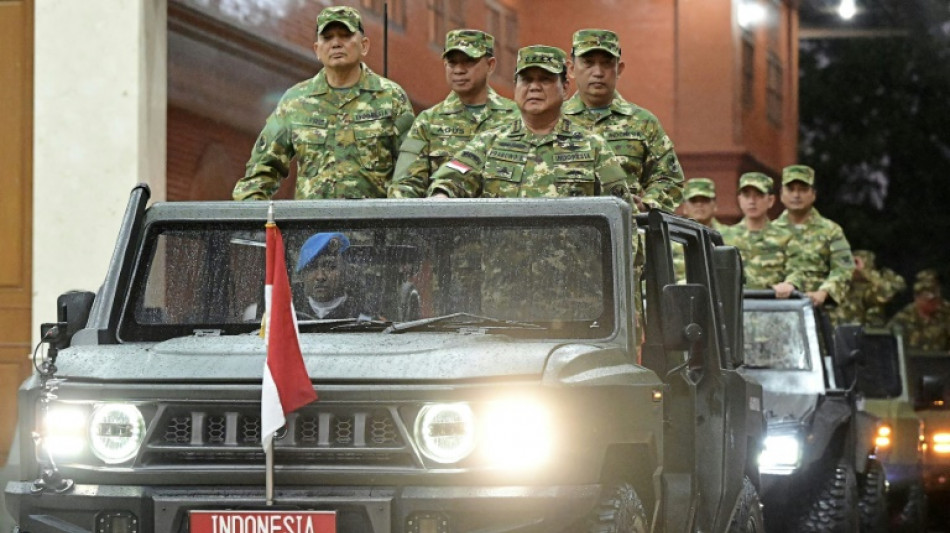
-
 US official tells UN top court 'serious concerns' over UNRWA impartiality
US official tells UN top court 'serious concerns' over UNRWA impartiality
-
Jeep owner Stellantis suspends outlook over tariffs

-
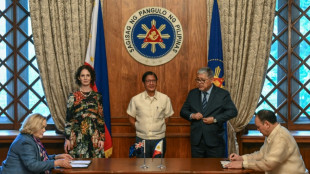 New Zealand, Phillippines sign troops deal in 'deteriorating' strategic environment
New Zealand, Phillippines sign troops deal in 'deteriorating' strategic environment
-
Aston Martin limits US car imports due to tariffs

-
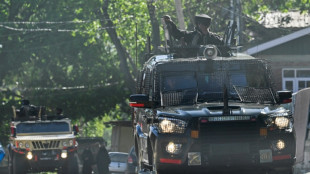 Pakistan says India planning strike as tensions soar over Kashmir
Pakistan says India planning strike as tensions soar over Kashmir
-
Australian triple-murder suspect allegedly cooked 'special' mushroom meal

-
 Most stock markets rise despite China data, eyes on US reports
Most stock markets rise despite China data, eyes on US reports
-
TotalEnergies profits drop as prices slide

-
 Volkswagen says tariffs will dampen business as profit plunges
Volkswagen says tariffs will dampen business as profit plunges
-
Jeep owner Stellantis suspends 2025 earnings forecast over tariffs

-
 China's Shenzhou-19 astronauts return to Earth
China's Shenzhou-19 astronauts return to Earth
-
French economy returns to thin growth in first quarter

-
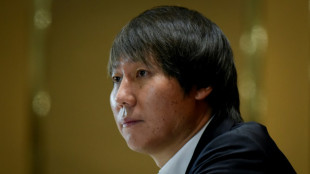 Ex-Premier League star Li Tie loses appeal in 20-year bribery sentence
Ex-Premier League star Li Tie loses appeal in 20-year bribery sentence
-
Belgium's green light for red light workers

-
 Haliburton leads comeback as Pacers advance, Celtics clinch
Haliburton leads comeback as Pacers advance, Celtics clinch
-
Rahm out to break 2025 win drought ahead of US PGA Championship

-
 Japan tariff envoy departs for round two of US talks
Japan tariff envoy departs for round two of US talks
-
Djurgarden eyeing Chelsea upset in historic Conference League semi-final

-
 Haliburton leads comeback as Pacers advance, Pistons stay alive
Haliburton leads comeback as Pacers advance, Pistons stay alive
-
Bunker-cafe on Korean border paints image of peace
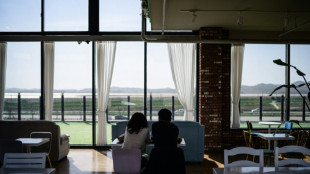
-
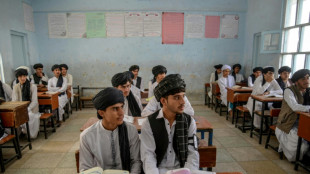 Tunics & turbans: Afghan students don Taliban-imposed uniforms
Tunics & turbans: Afghan students don Taliban-imposed uniforms
-
Asian markets struggle as trade war hits China factory activity

-
 Norwegian success story: Bodo/Glimt's historic run to a European semi-final
Norwegian success story: Bodo/Glimt's historic run to a European semi-final
-
Spurs attempt to grasp Europa League lifeline to save dismal season

-
 Thawing permafrost dots Siberia with rash of mounds
Thawing permafrost dots Siberia with rash of mounds
-
S. Korea prosecutors raid ex-president's house over shaman probe: Yonhap
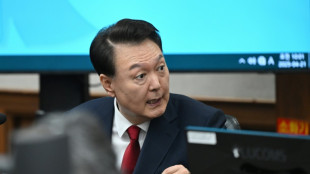
-
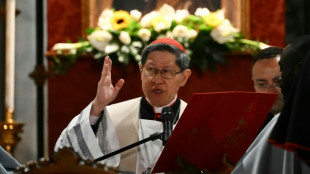 Filipino cardinal, the 'Asian Francis', is papal contender
Filipino cardinal, the 'Asian Francis', is papal contender
-
Samsung Electronics posts 22% jump in Q1 net profit

-
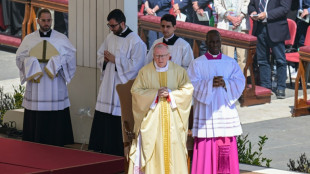 Pietro Parolin, career diplomat leading race to be pope
Pietro Parolin, career diplomat leading race to be pope
-
Nuclear submarine deal lurks below surface of Australian election
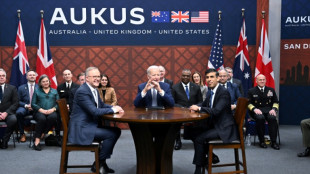
-
 China's manufacturing shrinks in April as trade war bites
China's manufacturing shrinks in April as trade war bites
-
Financial markets may be the last guardrail on Trump

-
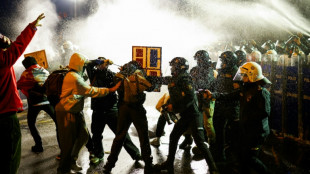 Swedish journalist's trial opens in Turkey
Swedish journalist's trial opens in Turkey
-
Kiss says 'honour of a lifetime' to coach Wallabies at home World Cup

-
 US growth figure expected to make for tough reading for Trump
US growth figure expected to make for tough reading for Trump
-
Opposition leader confirmed winner of Trinidad elections
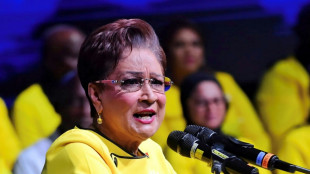
-
 Snedeker, Ogilvy to skipper Presidents Cup teams: PGA Tour
Snedeker, Ogilvy to skipper Presidents Cup teams: PGA Tour
-
Win or bust in Europa League for Amorim's Man Utd

-
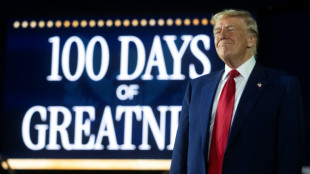 Trump celebrates 100 days in office with campaign-style rally
Trump celebrates 100 days in office with campaign-style rally
-
Top Cuban dissidents detained after court revokes parole
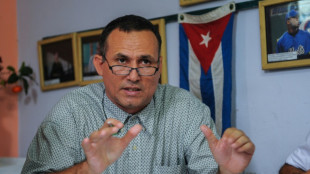
-
 Arteta urges Arsenal to deliver 'special' fightback against PSG
Arteta urges Arsenal to deliver 'special' fightback against PSG
-
Trump fires Kamala Harris's husband from Holocaust board

-
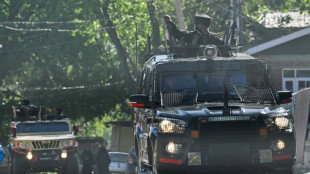 Pakistan says India planning strike as tensions soar over Kashmir attack
Pakistan says India planning strike as tensions soar over Kashmir attack
-
Weinstein sex attack accuser tells court he 'humiliated' her
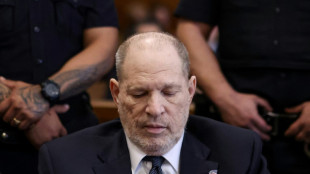
-
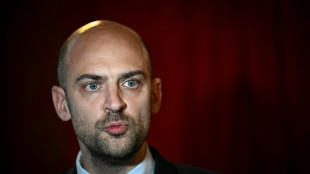 France accuses Russian military intelligence over cyberattacks
France accuses Russian military intelligence over cyberattacks
-
Global stocks mostly rise as Trump grants auto tariff relief

-
 Grand Vietnam parade 50 years after the fall of Saigon
Grand Vietnam parade 50 years after the fall of Saigon
-
Trump fires ex first gentleman Emhoff from Holocaust board

-
 PSG 'not getting carried away' despite holding edge against Arsenal
PSG 'not getting carried away' despite holding edge against Arsenal
-
Cuban dissidents detained after court revokes parole
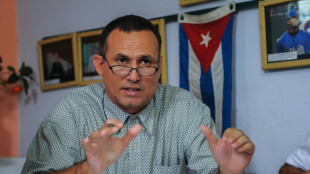

'Pandora's box': alarm bells in Indonesia over rising military role
Greater military influence in government, reporters under threat and a stuttering economy -- Indonesian President Prabowo Subianto's first six months in power have triggered alarm bells for activists worried about a return to the country's authoritarian roots.
Last month, Indonesia's parliament amended a law allowing active-duty military personnel to work in 14 state institutions -- up from 10 -- including the attorney general's office, which rights groups say could weaken legal checks on military abuse.
The decision has critics anxious that the world's third-largest democracy could hark back to the days of dictator Suharto, who ruled Indonesia with an iron fist for more than three decades.
"The government does not realise that Indonesia has a collective trauma over (Suharto's) authoritarian New Order government," said Hussein Ahmad, deputy director of rights group Imparsial.
Before Suharto was toppled by student-led protests in 1998, Prabowo was serving as a commander for an elite force to suppress unrest.
He remains accused of human rights abuses, including allegations that he had ordered the abduction of activists at the end of Suharto's rule -- which Prabowo has denied and never been charged for.
He has since rehabilitated his image, and was elected last year on the hopes that he would continue the policies of popular predecessor Joko Widodo.
Yet in the six months since coming into power, Prabowo's former life as a general has been thrust into the public eye.
His administration's move to expand the military's role in government has raised eyebrows even within Indonesia's political elite.
After Prabowo appointed government representatives to kickstart discussions of the law in parliament in February, former president Susilo Bambang Yudhoyono said it used to be "taboo" for military personnel to enter politics.
"It was one of the doctrines that we issued back then... If you want to do politics, resign," he told a meeting.
Presidential spokesman Hasan Nasbi denied that the new law would regress Indonesia back to Suharto's era.
"This law actually limits the role... to 14 sectors that truly need the skills and expertise relevant to (military) training," he told AFP, adding that the critics were "inaccurate".
- 'Silencing' journalists -
After his October inauguration, Prabowo paraded his cabinet in military fatigues at a retreat.
In November, his defence minister -- also a former general accused of abuses under Suharto -- announced that 100 battalions would be set up to enforce the government's agenda.
And Prabowo has also faced backlash in recent months for slashing government budgets, as Indonesia's flailing economy is further hit by a plummeting rupiah and see-sawing markets in reaction to Washington's tariffs.
Adding to worries is a new regulation issued last month allowing police to monitor foreign journalists and researchers.
It gives the police the authority to provide a permission letter when reporting from "certain locations" -- though a spokesperson later said the letter was "not mandatory".
But the regulation could still spook reporters working on sensitive topics, said Human Rights Watch's Andreas Harsono.
"Journalism always goes hand-in-hand with democracy," Andreas told AFP.
"If journalism is suppressed, the freedom of speech is suppressed, democracy will be paralysed."
The country's press flourished after the fall of Suharto, but local reporters have in recent weeks raised fears of an environment of intimidation.
Last month, Tempo magazine -- which publishes articles critical of the government -- was sent a pig's head and six decapitated rats.
Prabowo's spokesperson denied any government role in the incident, and said an investigation was ongoing.
Tempo's website also started seeing cyber attacks this month after it published an investigation into some gambling companies in Cambodia and its links to Indonesian tycoons and politicians.
Journalist Francisca Christy Rosana, who was doxxed in recent weeks, said they got the message loud and clear.
"This terror was not just aimed at intimidating but silencing and stopping our work."
- 'Fed up' -
Thousands across Indonesia last month protested the new law, carrying posters that called for the military to "return to the barracks".
Dismissing the public's outrage over the military's potential dual role in government as "nonsense", Prabowo said he respected the people's right to protest.
But if the demonstrations "create chaos and unrest, in my opinion this is against the national interest", he said in an interview earlier this month.
Andrie Yunus of KontraS, the commission for missing persons and victims of violence, said the demonstrations are "the tip of the iceberg".
"Civilians are fed up with the entry of militarism into civilian affairs," he said, warning that the path to a military regime "is open".
"We consider the passing of the (military law) to be an attempt to open Pandora's box."
C.Kreuzer--VB

